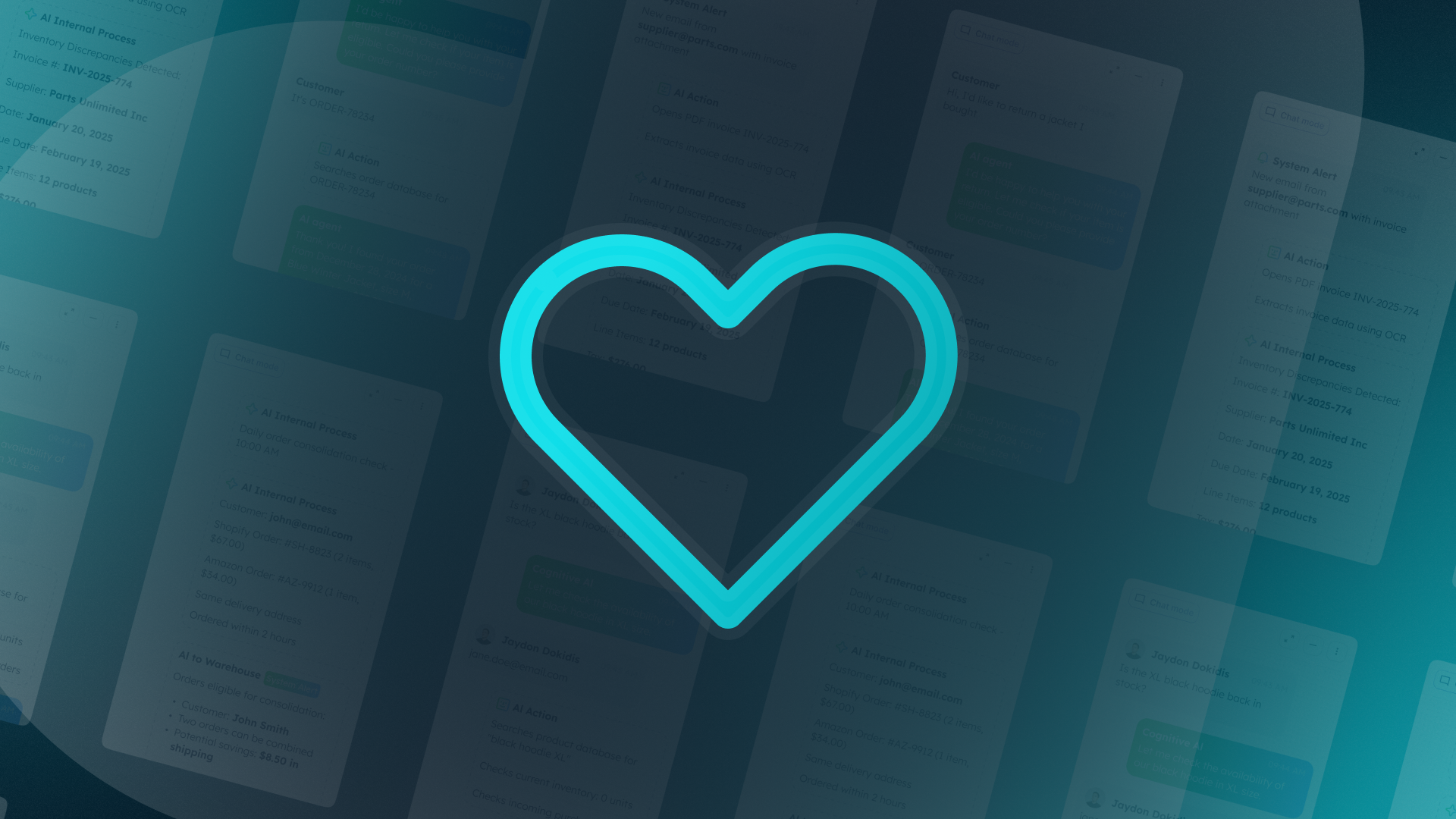
Imagine being able to get quick answers about your medication in the middle of the night, or a doctor spending less time on paperwork and more time with patients. That’s the promise of AI in healthcare: shorter wait times, better outcomes, and more human-centered care.
From managing prescriptions and appointments to offering mental health support, conversational AI is making healthcare simpler and more personal. But adoption isn’t easy – privacy, compliance, and patient trust all matter. With so many platforms out there, how do you know which one truly delivers? This guide will help you cut through the noise and find the solutions worth your time.
What Can Conversational AI Technology in Healthcare Do for Your Patients and Staff?
Healthcare conversational AI is a type of artificial intelligence that helps computers understand, process, and respond to human language in a way that sounds natural. These systems use machine learning and, most importantly, natural language processing, which includes both natural language understanding (to understand intent) and natural language generation (to create responses). They are meant to automate tasks, give health information, and help with clinical workflows. The goal is not to replace healthcare workers, but to make them better at their jobs by creating an AI system that acts as a smart partner in managing care.
Why it matters now
The healthcare sector is facing a number of urgent, overlapping problems that are making this technology more widely used. Clinician burnout is out of control, and there are still not enough staff members, so there is a massive need for tools that can help with repetitive tasks. Patients’ expectations for immediate, digital access are also rising, which is forcing providers to expand their services beyond phone calls and in-person visits. Healthcare conversational AI directly addresses these issues by providing a scalable solution that meets the needs of today’s patients while also making operations more efficient.
Key capabilities
These platforms can do a lot more than just answer simple questions. They are advanced tools that make the patient experience and the work of clinical staff better. The most important features are:
- Intelligent patient engagement. Using natural language interactions to check symptoms, teach patients about their health, and give them mental health support, all while collecting important health information
- Administrative automation. Taking care of everyday tasks like helping patients make appointments, sending medication reminders to help them manage their medications better, and following up with patients after they leave the hospital, which saves a lot of money
- Clinical workflow support. Helping professionals by sorting through patient questions, getting the right information from health records, and making patient interactions more efficient. This directly helps keep patients safe and leads to better health outcomes
- Advanced applications. With the rise of generative AI, these systems can now write clinical notes, help with drug discovery research, and make patient experiences more complex. Strong security measures are always needed to protect sensitive information, and there should be easy ways for people to step in when complicated problems come up
By taking care of these simple tasks, conversational AI frees human staff to do what they do best: provide complex, compassionate patient care.
What Are the Real-World Benefits of Conversational AI in Healthcare?
The technology behind healthcare conversational AI is great, but its value comes from the real problems it solves for health systems, providers, and patients. The benefits are being measured in terms of saved time, lower costs, and better patient outcomes, going beyond what is possible in theory. This is how intelligent automation is making a difference in the real world.
Enhanced patient engagement and empowerment
With conversational AI in healthcare, passive patients become active participants in their own healthcare. These systems answer questions, teach patients about their health, and give mental health support whenever needed by giving people access to reliable health information 24 hours a day, 7 days a week. A proactive approach keeps patients and their providers in touch all the time, which helps them make better decisions and makes patients much happier. Modern patients want convenience and control, and the ability to have natural, informative interactions with their doctors at any time meets those needs.
A significant increase in operational efficiency
This is where the benefits for the business and the money become clear. Conversational AI in healthcare is great at automating repetitive tasks that take up a lot of staff time. Organizations can cut down on the number of phone calls they get by letting patients schedule appointments, check test results, or ask for prescription refills through an AI system. This makes workflows easier and lets healthcare professionals and administrative staff focus on more difficult tasks. The direct result is that business costs go down and efficiency increases significantly across the board.
Strengthened patient safety and clinical outcomes
The most significant advantage may be that conversational AI in healthcare helps keep patients safe and improves their well-being. AI-powered tools help with medication management by sending reminders on time and making instructions clearer, which cuts down on mistakes. They can also do smart triage to make sure that patients who need help right away get it right away. AI can give healthcare professionals useful information at the point of care by connecting it to health records, helping them make more accurate diagnoses and treatment plans tailored to each patient.
Scalable, cost-effective care delivery
Using conversational AI in healthcare on a large scale could help solve the urgent scalability problem. These systems can handle thousands of patient interactions at once without needing more staff, which makes it possible to provide high-quality patient education and follow-up care on a large scale. Automated reminders that reduce no-shows, better staff allocation, and better management of operational costs all lead to clear returns on investment, making advanced care delivery models long-lasting.
Data-driven insights for continuous improvement
Whenever you talk to a conversational AI platform, it collects useful health data. With the right privacy and security measures in place, this information can be analyzed to find patterns in patient needs, common misunderstandings, and ways to improve processes. This feedback loop gives healthcare professionals and administrators the chance to improve services, customize patient experiences, and make strategic choices based on real-world data, leading to even better future care management.
Leading Conversational AI in Healthcare and Pharma Platforms
It’s clear that healthcare conversational AI has a lot of potential, but its success depends on a critical choice: picking the right platform. There are many different companies in the market, from big AI companies that offer broader services to smaller ones that focus on specific conversational AI in healthcare use cases, like managing medications or sorting patients. A platform that works great for the emergency department of a big hospital system might be too complicated for a community clinic’s needs when it comes to scheduling appointments.
It’s not enough to just pick the most famous name. The best platform should be able to adapt to your team’s unique workflows, work with your current EHR, and help you solve your biggest problems. So, let’s explore the leading platforms to help you cut through the hype and find a suitable conversational AI in healthcare tool:
1. CogniAgent: The Adaptive Platform for Complex Healthcare Workflows
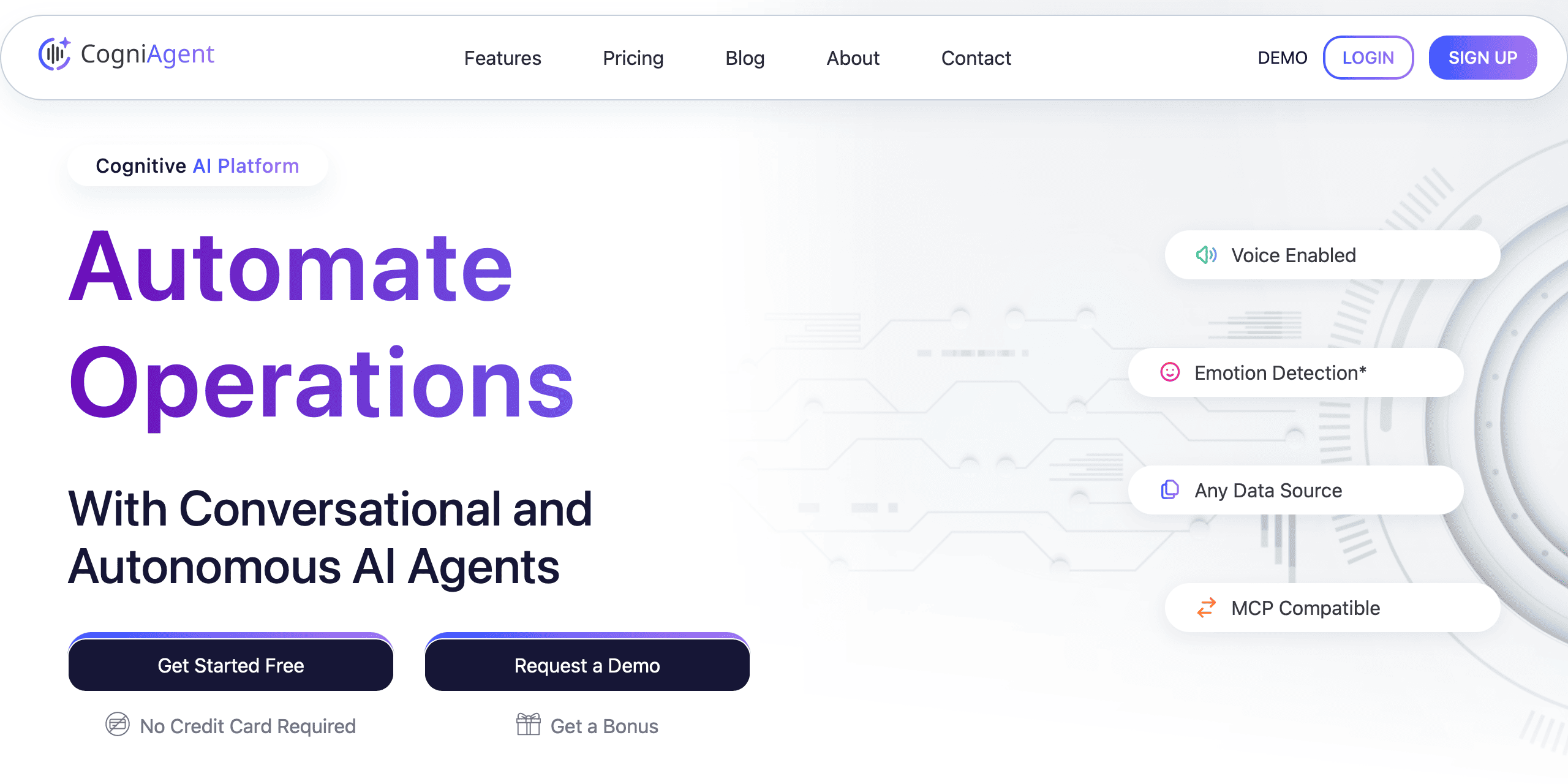
CogniAgent is a platform for building AI that lets businesses create advanced, voice-enabled, emotionally intelligent agents without writing code. It uses a proprietary six-layer cognitive architecture to integrate data ingestion, semantic search, adaptive planning, and workflow execution into one place. The platform works with all types of data and lets people interact with it in a way that changes based on emotional cues in real time. This makes it perfect for complicated healthcare and pharmaceutical workflows.
Key features:
- Intuitive, low-code agent builder: Deploy AI agents in minutes with no programming expertise required.
- Emotionally aware interactions: Go beyond simple text exchanges with our platform, which analyzes voice sentiment and tonal cues in real time, responds with empathy, and adapts its communication style.
- Universal data integration: Process PDFs, videos, EHRs, spreadsheets, and APIs without format limits.
- Multi-agent planning & collaboration: Tackle intricate processes with a coordinated team of specialized AI agents.
- Contextual visual engagement: Align visual content (e.g., educational materials) with conversational context.
Primary use cases:
- Intelligent patient triage and routing: Advanced symptom assessment that directs patients to the right level of care (ED, urgent care, PCP).
- Pharma support and adherence: For conversational AI in healthcare and pharma, manage patient support programs, provide medication information, and send adherence reminders.
- Chronic disease management: Proactive check-ins and coaching for patients with conditions like diabetes or hypertension.
Best for: Healthcare organizations that need a customizable platform to automate clinical workflows and patient engagement scenarios.
Pricing: Free plan with 500 credits; Pro plan – $33/month; Business – $181/month; Custom enterprise plans available.
2. Nuance (Microsoft) Dragon Ambient EXPE (DAX)
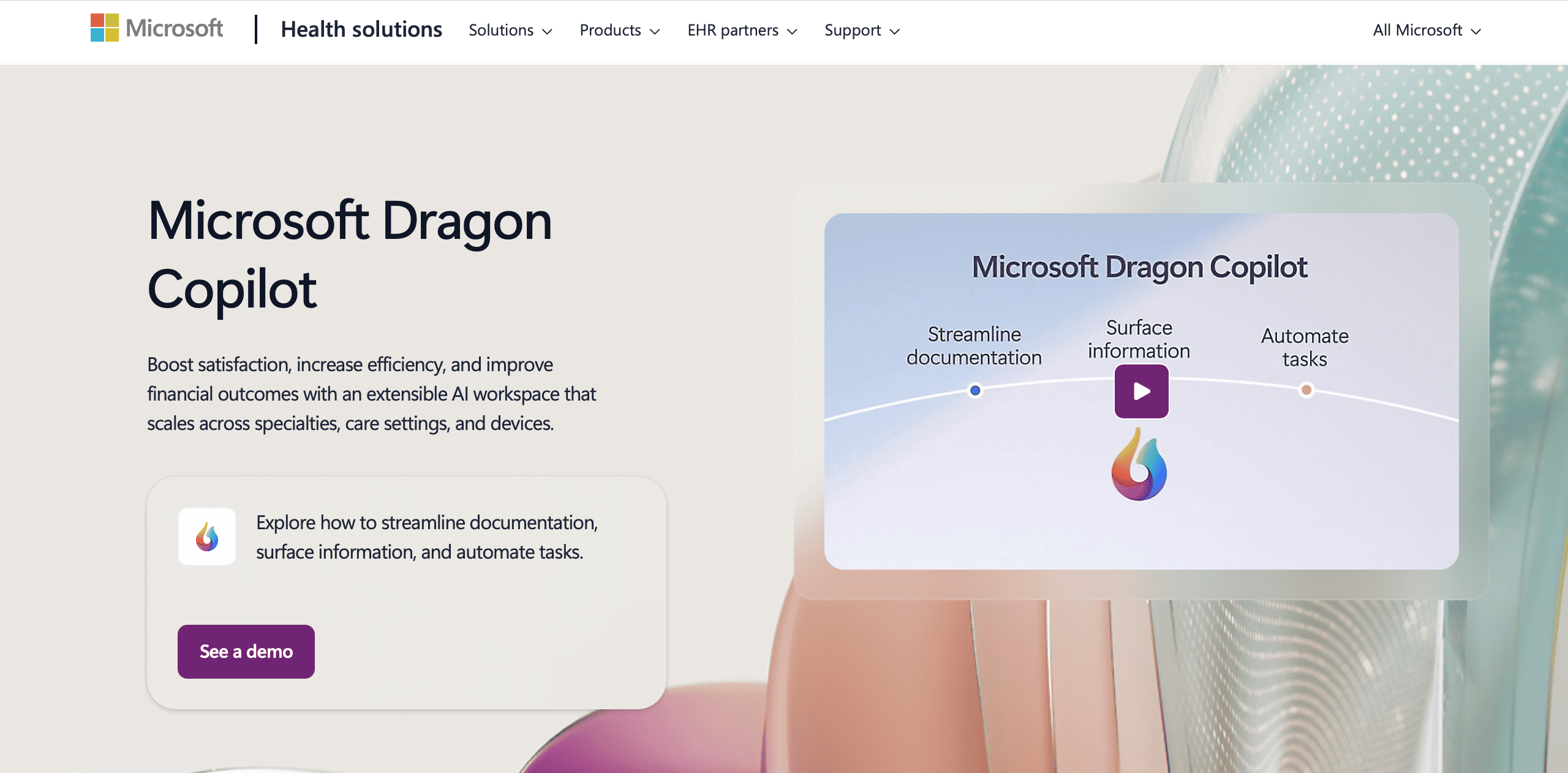
Nuance DAX is a clinical intelligence platform that uses conversational AI to make clinical documentation easier. It listens to the natural conversation between a doctor and a patient during a visit and automatically writes down accurate clinical notes. The doctor then reviews and signs these notes.
Key features:
- Ambient scribing and automated note-taking
- EHR integration (e.g., Epic, Cerner)
- Voice commands for EHR navigation
- Reduces documentation burden and burnout
Best for: Reducing physician burnout and administrative burden.
Pricing: Typically sold on a per-clinician, per-month subscription model; pricing requires a custom quote.
3. Google Cloud Healthcare API & Dialogflow CX
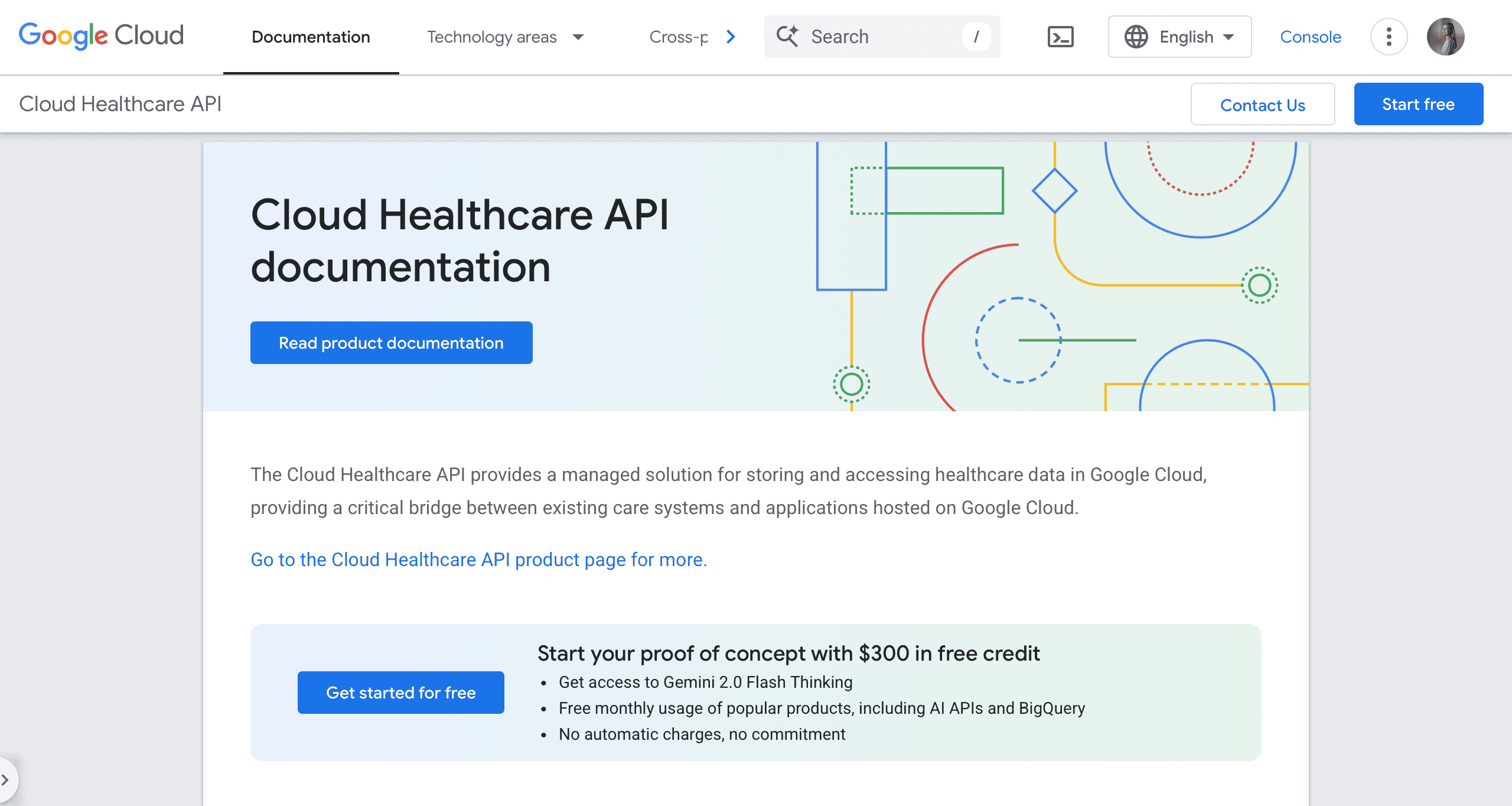
This is a set of tools from Google Cloud that developers can use to make their own healthcare AI solutions. The Healthcare API is a secure way to store and manage health information, and Dialogflow CX is a powerful tool for creating and building advanced conversational AI agents.
Key features:
- Secure, HIPAA-compliant healthcare data API
- Advanced natural language understanding (Dialogflow CX)
- Integration with Google’s AI and machine learning services
- Highly flexible and customizable agent building
Best for: Organizations with strong in-house IT teams building bespoke solutions.
Pricing: Pay-as-you-go model based on API calls, data storage, and Dialogflow agent interactions.
4. Rasa for Healthcare
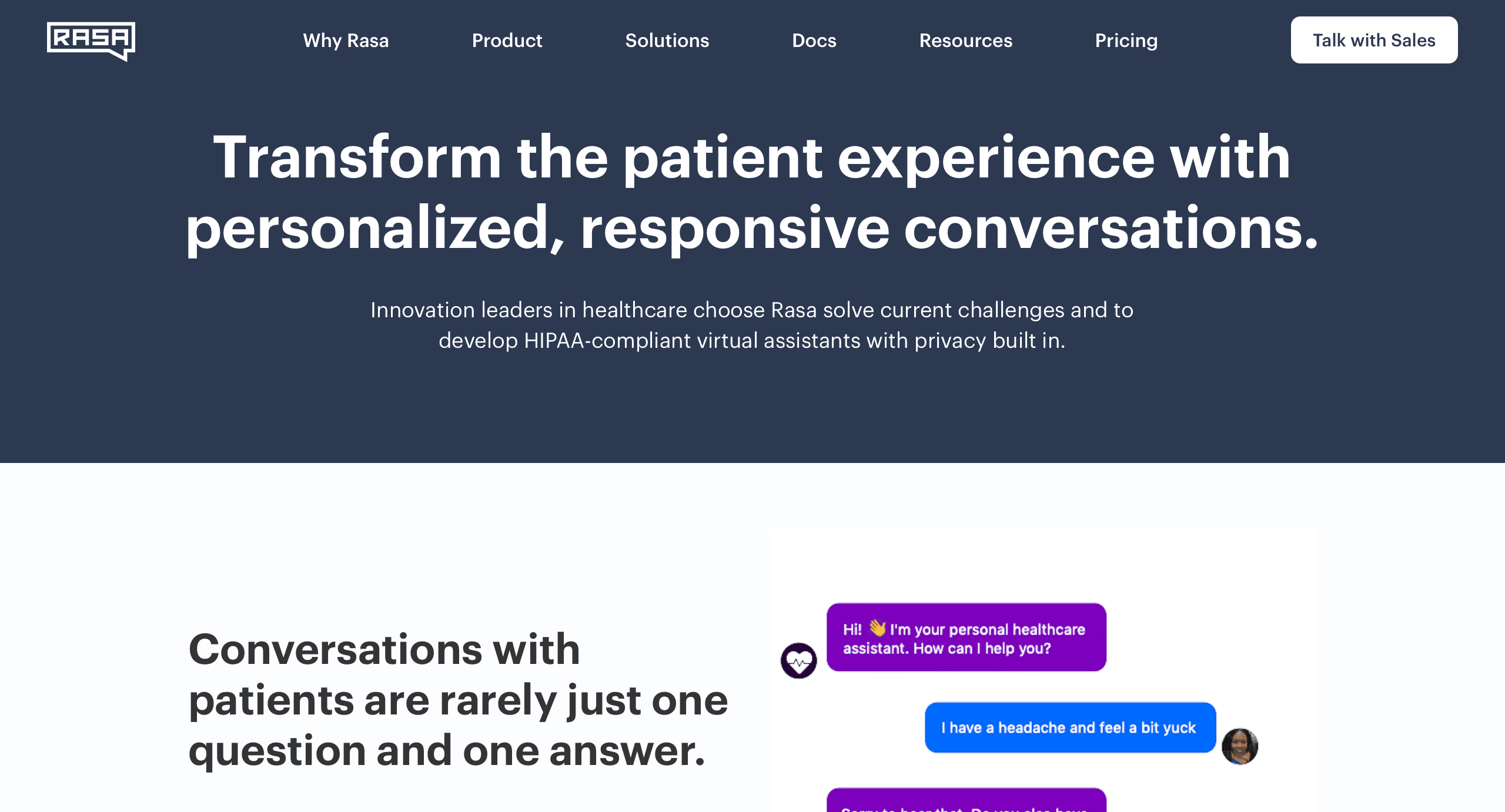
Rasa is one of the best open-source frameworks for creating AI assistants that understand context. It gives developers the most control over the AI model, conversation flows, and data, allowing them to create unique and personalized conversational experiences.
Key features:
- Open-source framework (Rasa Open Source)
- Enterprise-grade management tools (Rasa Pro)
- Complete data ownership and control
- Highly customizable dialogue management
Best for: Health IT companies and innovators wanting to build a completely proprietary solution.
Pricing: Rasa Open Source is free; Rasa Pro (enterprise edition) has annual subscription fees based on deployment scale.
5. Infermedica
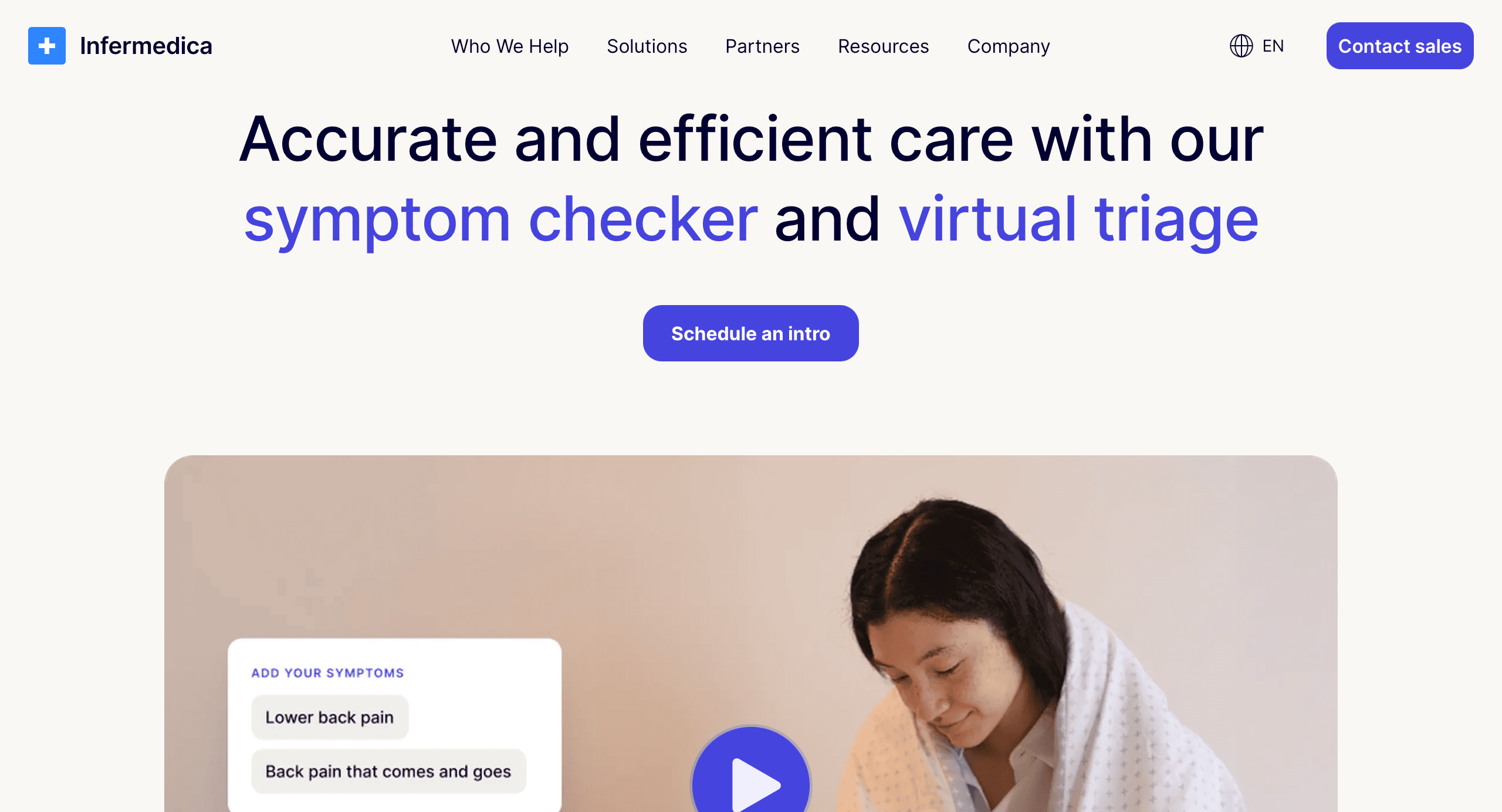
Infermedica makes AI-powered tools for pre-diagnosis and triage. Its main technology is a complex symptom checker and patient triage engine that helps people understand their symptoms and directs them to the right level of care.
Key features:
- AI-powered symptom checker and triage API
- Patient intake and triage platform
- Clinical data analysis and risk assessment
- SDKs for easy integration into apps and websites
Best for: Providers and insurers looking to implement a primary care gateway.
Pricing: Custom pricing based on API call volume and specific product modules; requires a demo and quote.
6. Kore.ai Healthcare
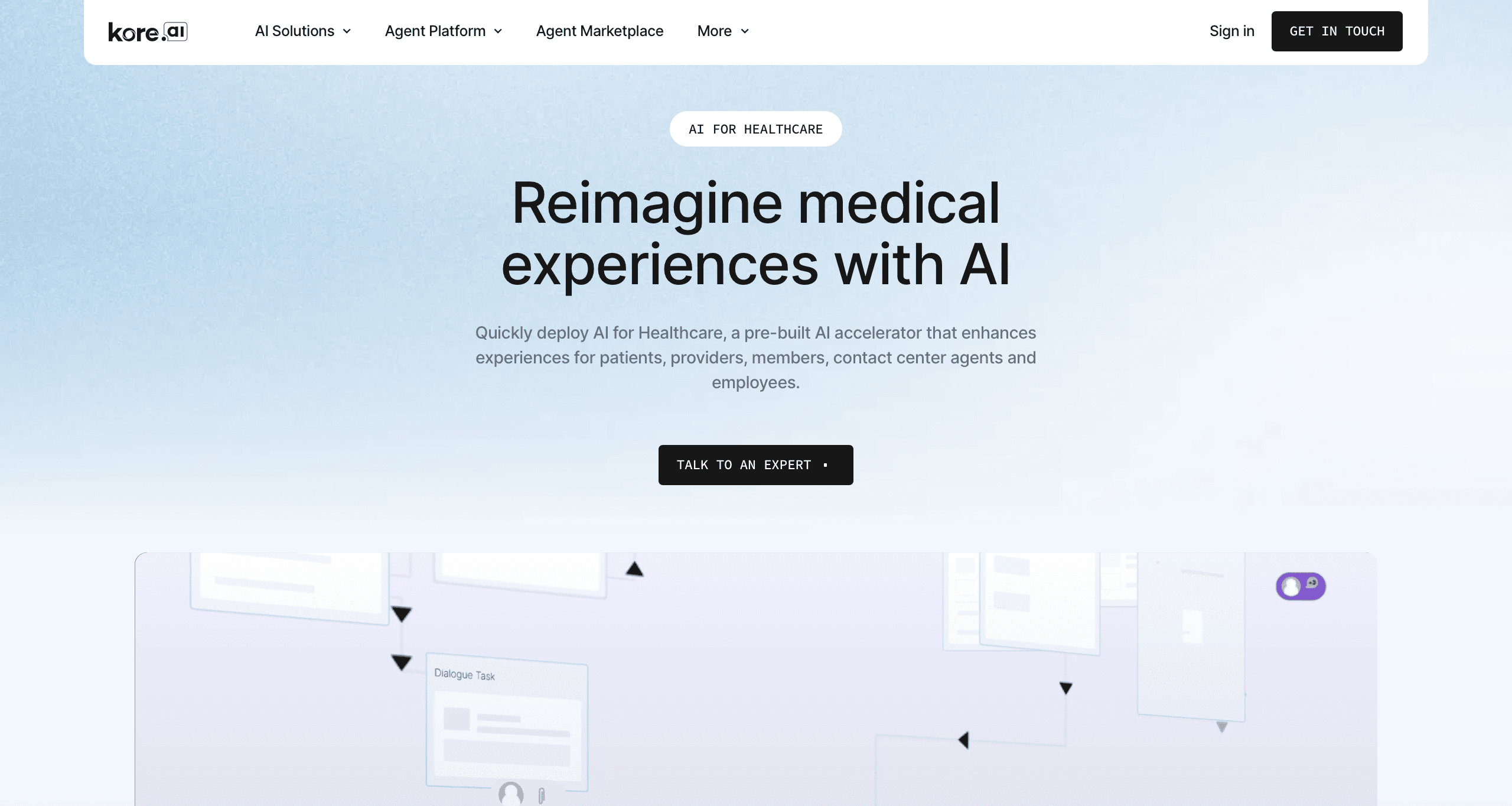
Kore.ai is a no-code/low-code experience optimization platform that focuses on automating workflows across the whole company. It has pre-made tools and solutions for making AI assistants that can do a variety of tasks, such as helping patients, employees, and back-office operations.
Key features:
- No-code/low-code bot builder
- Pre-built AI solutions for healthcare
- Omnichannel deployment (voice and digital)
- Workflow automation across departments
Best for: Streamlining internal operations and patient-facing services with a single platform.
Pricing: Typically enterprise licensing based on users, conversations, or channels; custom quotes required.
7. Ada Health
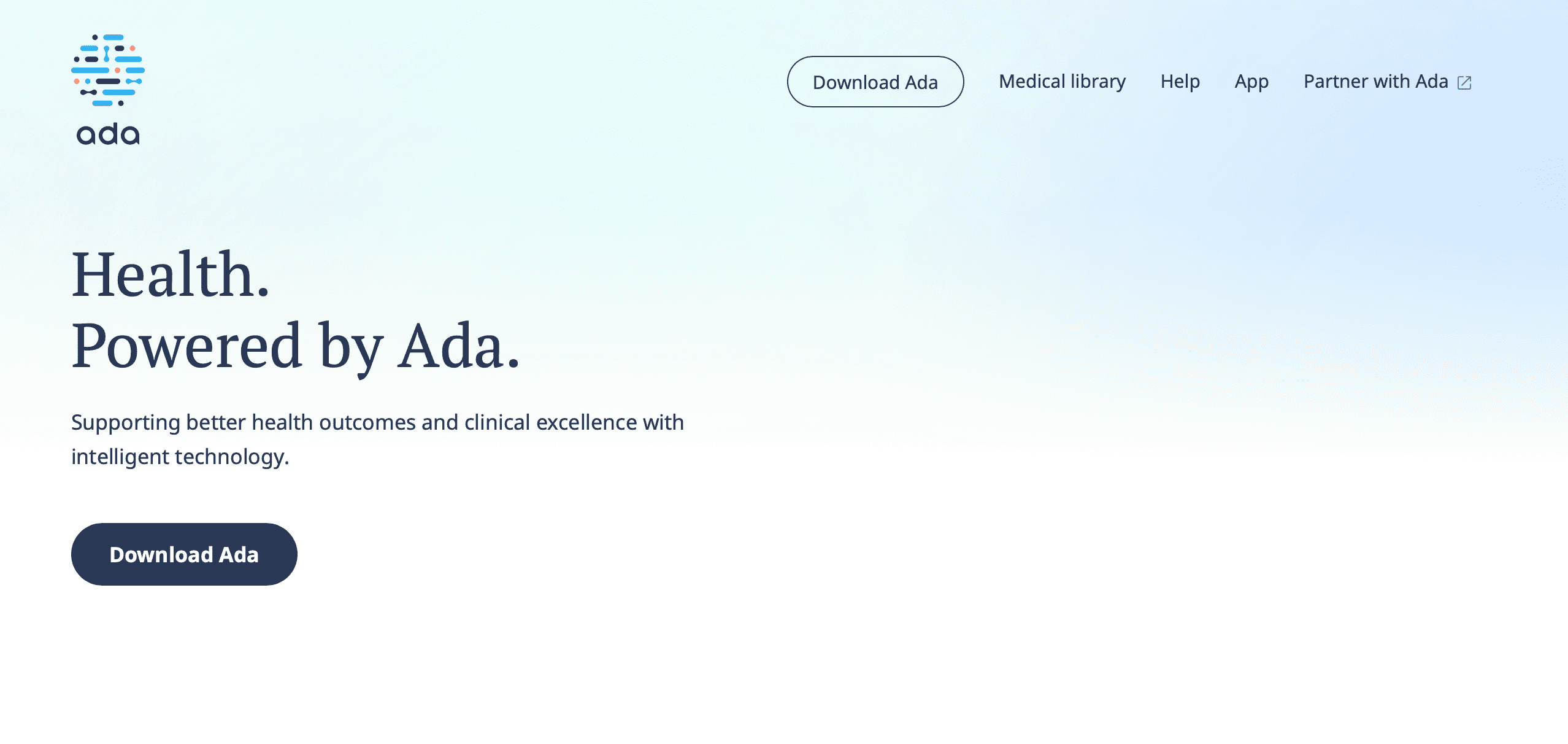
Ada Health is a health advice app that uses AI and an extensive database of medical knowledge to help users figure out what their symptoms mean. It is primarily a B2C app that works with health systems to get new patients and keep them engaged.
Key features:
- Patient-facing symptom assessment app
- Extensive medical knowledge base
- Multilingual and global reach
- Partnership model for health systems
Best for: Consumer-facing health apps and partnerships with health systems for patient acquisition.
Pricing: Partnership and licensing model; pricing is not publicly disclosed and is tailored to each collaboration.
8. Buoy Health
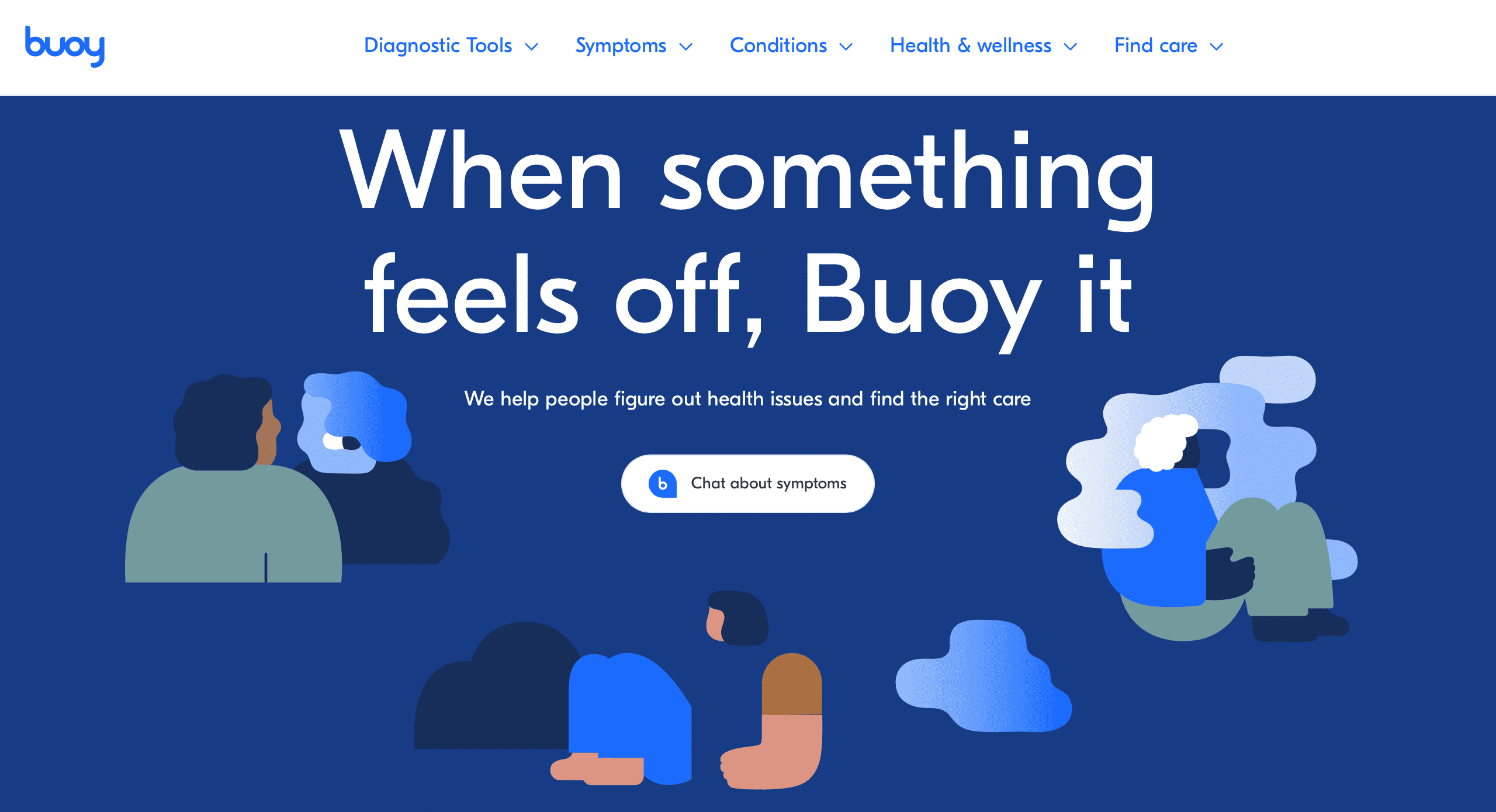
Buoy Health has an AI health assistant that is easy for people to use. It helps them check their symptoms and find the proper care. The assistant talks to users through a chat-like interface to determine their symptoms and connect them with the right care options in a health system’s network.
Key features:
- AI-powered symptom triage and care navigation
- User-friendly chat interface
- Integration with health system provider directories
- Aims to improve access and reduce costs
Best for: Health systems and payers aiming to improve the front-end of the patient journey.
Pricing: Custom enterprise pricing model based on the size of the member or patient population.
9. Fabric
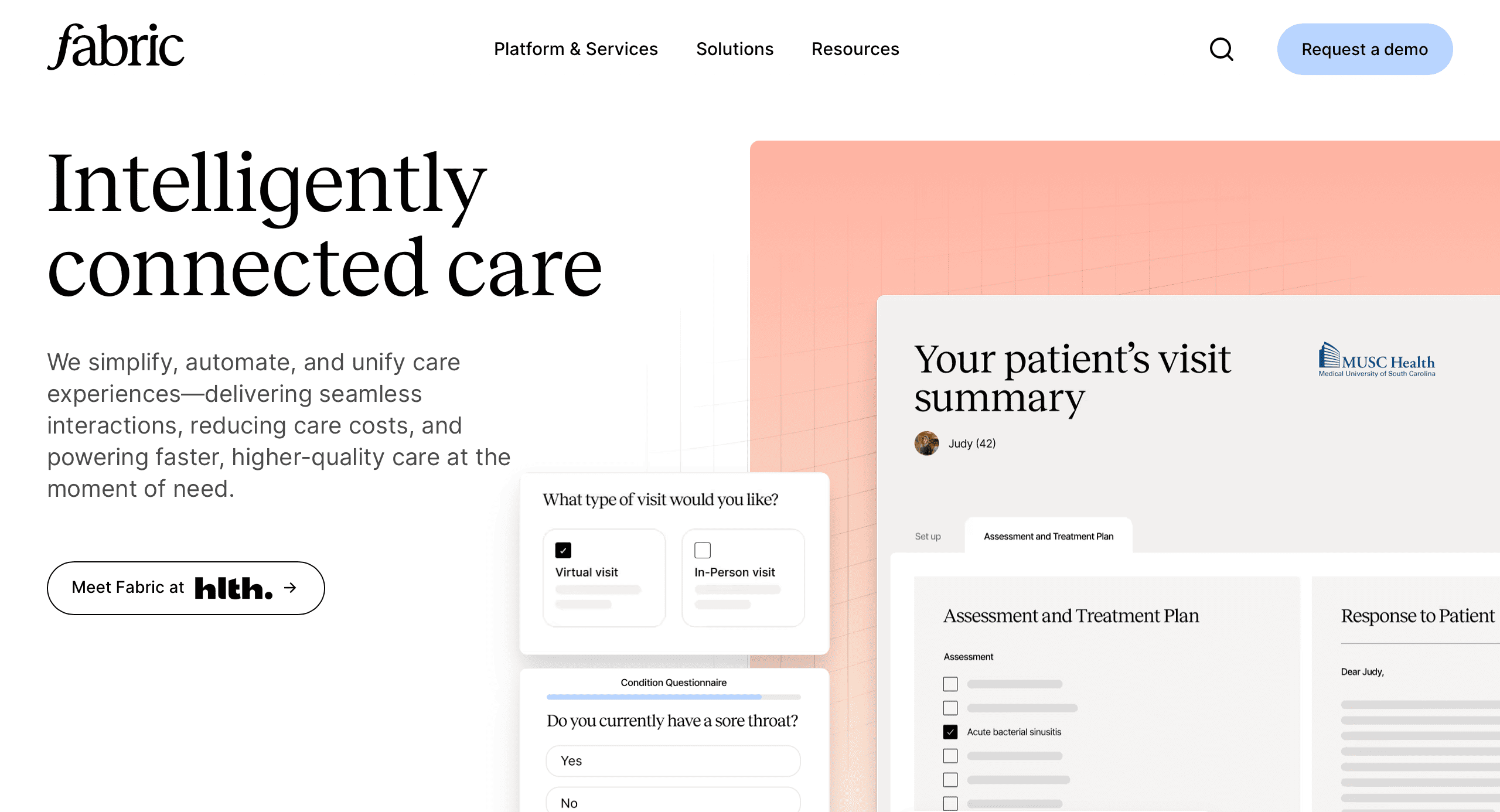
GYANT and Babylon Health represent different approaches to virtual care. The goal of GYANT is to turn patient-reported data into structured information that clinicians can use in the EHR. Babylon Health is a full “telehealth-first” platform that combines AI-powered triage with online visits.
Key features:
- GYANT: Patient data collection and EHR integration, clinical decision support.
- Babylon Health: AI Triage, Virtual Consultations, Digital Health Passports.
Best for: Organizations building end-to-end virtual care services.
Pricing: Enterprise-level pricing; requires direct contact for a custom quote based on services required.
Conversational AI Use Cases in Healthcare That Inspire
It’s not just theory that shows the real power of conversational AI in healthcare; it’s how it works in real life. These systems are changing how clinics and hospitals around the world work and how patients feel by automating routine tasks and giving smart support. The following examples show how conversational AI significantly affects healthcare in real life, giving us a taste of a more efficient future focused on patients. Consider this your first conversational AI in healthcare case study in miniature:
Use case #1: Emergency department triage assistant
Imagine that the emergency department of a large urban hospital is always too full. The issue hinders admin staff from doing timely work and causes burnout. To handle the influx, they put a conversational AI in a healthcare solution at the front end:
How it works: When patients arrive, they talk to an AI agent on a tablet if they are not in critical condition. The agent does a structured, flexible interview based on the person’s primary complaint, asking questions to clarify symptoms, severity, and medical history.
The outcome: The result is that the AI safely fills out a triage note in the EHR for the nurses and correctly sends patients to the best place for care, whether that be the main ED for urgent issues, a fast-track area for minor injuries, or a scheduled appointment with a primary care provider. This practical use of conversational AI in healthcare cuts down on wait times, makes sure that the most critical cases are seen first, and makes both patients and staff happier.
Use case #2: Proactive chronic condition management coach
A cardiology clinic wants to help its patients with congestive heart failure (CHF), a condition that needs to be monitored every day:
How it works: The clinic signs up CHF patients for a program that uses conversational AI in healthcare. Every morning, patients get a personalized, conversational check-in through SMS or a patient portal app. The AI asks about your weight, any swelling, any trouble breathing, and whether or not you are taking your medicine. It gives patients personalized education and reminders based on how they answer.
The result: If the AI sees a worrying trend, like fast weight gain, which is a sign of fluid retention, it automatically tells a nurse to check on it right away. Using conversational AI in healthcare helps keep people from going back to the hospital, gives patients more control over their health, and lets doctors step in early, leading to better long-term health outcomes.
Use case #3: 24/7 post-discharge follow-up program
A surgical center’s clinical staff is getting a lot of calls from patients with routine questions after same-day procedures.
How it works: After they leave the hospital, every patient is put into an automated follow-up program that uses conversational AI in healthcare. The AI agent checks in every day for the first 72 hours to ask about pain levels, incision sites, and how well the patient handles their medication. It answers common questions about recovery and gives you the right instructions for after surgery.
The result: The system cuts down on a lot of unnecessary calls to the clinic. More importantly, it uses clinical algorithms to find answers that could mean complications, like signs of infection. A human nurse is called in right away for these cases. This new use of conversational AI in healthcare makes patients safer, gives them peace of mind, and lets clinical staff focus their skills on the patients who need them the most.
These use cases show that using conversational AI strategically in healthcare can improve care quality, make better use of resources, and make the healthcare system more resilient.
Build a Powerful Agent in 5 Minutes with Our No-Code Platform
Even though many healthcare organizations are still trying to figure out how to deal with the problems of static, rule-based automation, the future is already here. CogniAgent is the next generation of conversational AI in healthcare. It’s a full platform where AI agents don’t just follow scripts; they think, adapt to complicated clinical situations, and grow with your organization’s changing needs.
Getting started with CogniAgent is simple: You can request a demo or talk to our representatives if you still have questions.

